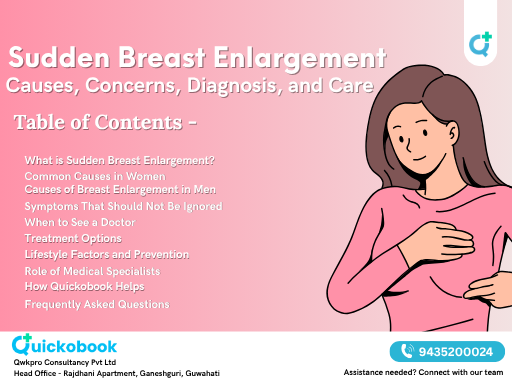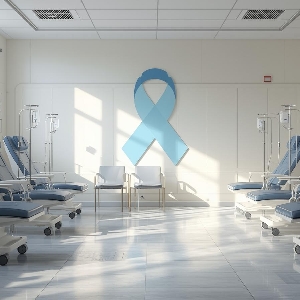Introduction
Sudden changes in the body can be unsettling, especially when they involve sensitive areas like the breasts. Sudden breast enlargement is a symptom that may affect both women and men, and it often raises concerns about underlying medical issues. While it can result from hormonal fluctuations or benign conditions, it may also point to more serious health concerns that require prompt evaluation.
With platforms like Quickobook, you can easily Book Doctor consultations with a Gynacologist, Oncologist, or General Surgeon and even Book Test procedures from the comfort of your home.
This comprehensive guide explores the potential causes, warning signs, diagnostic approaches, and when you should seek professional help.
Table of Contents
- What is Sudden Breast Enlargement?
- Common Causes in Women
- Causes of Breast Enlargement in Men
- Symptoms That Should Not Be Ignored
- When to See a Doctor
- Diagnostic Procedures
- Treatment Options
- Lifestyle Factors and Prevention
- Role of Medical Specialists
- How Quickobook Helps
- Frequently Asked Questions
- Final Thoughts
What is Sudden Breast Enlargement?
Sudden breast enlargement refers to an unexpected and rapid increase in breast size, often accompanied by tenderness, swelling, or other changes in breast tissue. It may occur in one or both breasts and can happen over a few hours or days.
The breast is composed of glandular tissue, fat, and connective tissue—all of which can respond to inflammation, hormonal changes, or trauma. Because this symptom can range from mild to serious, it's essential to evaluate any unexplained changes with a healthcare provider immediately.
Common Causes in Women
1. Hormonal Changes
Fluctuations in estrogen and progesterone during menstruation, pregnancy, or menopause can cause fluid retention in the breast tissues, leading to enlargement. This change is often cyclical and may reverse naturally. Hormonal therapy or contraceptives may also contribute.
2. Breast Infections (Mastitis)
Most common in lactating women, mastitis is caused by a bacterial infection, typically entering through a cracked nipple. It causes redness, swelling, warmth, and sometimes fever. If left untreated, it may lead to an abscess.
3. Fibrocystic Breast Changes
Characterized by ropey or lumpy textures in the breasts, fibrocystic changes can lead to temporary swelling. Though benign, they can cause significant discomfort and be mistaken for more serious issues.
4. Breast Trauma
Accidents, surgery, or even vigorous exercise can result in bruising or fat necrosis, which might mimic a lump and lead to noticeable swelling. The area may feel tender or firm.
5. Allergic Reactions or Insect Bites
Sudden inflammation of the breast can be caused by allergies or insect bites, resulting in localized redness and enlargement that usually subsides with antihistamines.
6. Medications or Hormone Therapy
Certain drugs, such as corticosteroids, anabolic steroids, and hormone replacement therapies, can cause fluid retention and stimulate breast tissue growth.
7. Breast Cancer
Particularly inflammatory breast cancer can cause rapid swelling and redness, often without a distinct lump. Other signs include skin dimpling and nipple inversion. Immediate evaluation by an Oncologist is critical in such cases.
READ ALSO: Breast Lump Explained: Causes, Symptoms, Diagnosis & When To Worry
Causes of Breast Enlargement in Men
Though less common, men can experience sudden breast enlargement due to several conditions:
1. Gynecomastia
A common condition involving benign breast tissue enlargement, gynecomastia occurs due to an imbalance of estrogen and testosterone. It can affect one or both breasts.
2. Obesity
Excess fatty tissue in the chest area may mimic or worsen breast enlargement. This condition is sometimes referred to as pseudogynecomastia.
3. Medication Side Effects
Drugs such as anti-androgens, antidepressants, heart medications, and alcohol or recreational drugs can contribute to hormonal changes leading to breast enlargement.
4. Liver or Kidney Disease
Chronic illnesses can disrupt hormone metabolism, leading to a hormonal imbalance and subsequent tissue changes.
5. Male Breast Cancer
Although rare, men can develop breast cancer. A sudden increase in size of one breast, especially if accompanied by a hard lump or nipple discharge, should not be ignored. An immediate consultation with a General Surgeon or Oncologist is advised.
Symptoms That Should Not Be Ignored
While temporary breast swelling might resolve on its own, persistent or sudden changes should not be ignored:
- One breast significantly larger than the other
- Tenderness, burning sensation, or pain
- Redness or warmth in the breast skin
- Nipple discharge, especially if bloody
- Skin dimpling, puckering, or thickening
- A palpable lump or unusual hard area
- Fever or fatigue, indicating infection
When to See a Doctor
Medical consultation is essential if:
- The enlargement is rapid and persistent
- There’s visible skin change, dimpling, or rash
- The breast feels heavy, hard, or tender
- You notice changes in the nipple or areola
- You have a personal or family history of breast cancer
Timely consultation helps prevent complications. Through Quickobook, you can Book Doctor appointments with a Gynacologist, Oncologist, or General Surgeon effortlessly.
Diagnostic Procedures
1. Clinical Breast Examination
Your doctor will conduct a detailed manual exam to assess the breast tissue, check for lumps, discharge, or tenderness, and examine nearby lymph nodes.
2. Breast Ultrasound
This imaging test is used to identify the nature of the swelling—whether it’s fluid-filled (cyst) or solid (potentially a tumor). It’s especially effective for women under 40.
3. Mammogram
This X-ray imaging test is more effective in detecting cancerous masses, especially in women over 40. It helps detect calcifications, tumors, or suspicious lesions.
4. MRI (Magnetic Resonance Imaging)
Used for deeper evaluation in ambiguous cases or when multiple masses are present. It’s often employed for high-risk patients.
5. Biopsy / FNAC
A tissue sample is removed and sent for histopathological analysis. This test confirms or rules out cancer and identifies the exact nature of any growth.
All of these tests can be scheduled with minimal waiting using the Book Test feature on Quickobook.
Treatment Options
Depending on the diagnosis, treatment plans can vary significantly:
1. For Infections
- Antibiotics are prescribed to treat bacterial infections like mastitis.
- Pain relievers and warm compresses help manage symptoms.
2. For Hormonal Issues
- Adjustments in hormone therapy may resolve the issue.
- In some cases, medications like tamoxifen are used to manage hormone-sensitive tissue changes.
3. For Benign Tumors
- Observation may be sufficient.
- Surgical removal may be needed if they grow or cause discomfort.
4. For Breast Cancer
- Surgery: Lumpectomy or mastectomy depending on the size and spread
- Chemotherapy or radiation
- Hormonal or targeted therapy, especially in HER2-positive cases
Early intervention ensures the best prognosis. Don’t delay—Book Doctor via Quickobook today.
Lifestyle Factors and Prevention
While not all causes are preventable, some lifestyle changes can reduce the risk of sudden breast enlargement:
- Maintain a healthy body weight
- Limit alcohol and avoid recreational drugs
- Exercise regularly to maintain hormone balance
- Avoid unnecessary hormone therapy unless prescribed
- Wear a well-fitting bra to avoid trauma and discomfort
- Practice monthly breast self-examinations to detect early changes
- Schedule annual clinical breast exams, especially if you're over 40 or have risk factors
Role of Medical Specialists
Gynacologist
- Handles hormone-related and reproductive causes of breast changes
- Guides younger women through puberty, menstruation, or menopause-related symptoms
Oncologist
- Manages diagnosis and treatment of all cancer-related conditions
- Oversees chemotherapy, radiation, and long-term cancer management
General Surgeon
- Performs biopsies and removes benign or malignant lumps
- Treats infections like abscesses and other surgical concerns
How Quickobook Helps
Quickobook is a comprehensive healthcare platform designed to ensure timely and accessible medical care. Here’s what it offers:
- Book Doctor appointments across specialties
- Book Test services including ultrasounds, mammograms, and biopsies
- Digital access to medical records and prescriptions
- Teleconsultation options for remote areas
- 2,000+ healthcare centers integrated across East and Northeast India
Whether you’re in a city or a village, Quickobook makes expert care reachable and reliable.
(FAQ) Frequently Asked Questions
Q1. Is sudden breast enlargement always serious?
Not necessarily. It can result from hormonal changes, infections, or trauma, but it should always be evaluated to rule out serious conditions.
Q2. Can men experience breast enlargement suddenly?
Yes, due to gynecomastia, hormonal imbalances, or rarely, male breast cancer.
Q3. How is breast enlargement diagnosed?
Diagnosis involves physical examination, imaging (ultrasound, mammogram), and possibly a biopsy.
Q4. Can I prevent sudden breast changes?
While some factors aren’t preventable, maintaining a healthy lifestyle and undergoing regular screenings can significantly reduce risks.
Q5. What if I live in a remote area?
Quickobook offers online consultations, test bookings, and medicine deliveries, making healthcare accessible from anywhere.
Final Thoughts
Sudden breast enlargement can be caused by a range of factors—from harmless hormonal fluctuations to serious medical conditions like inflammatory breast cancer. The key to managing it effectively lies in timely evaluation, proper diagnosis, and a well-planned treatment approach.
With Quickobook’s digital-first platform, you can easily Book Doctor, Book Test, and consult with a Gynacologist, Oncologist, or General Surgeon based on your condition. Our team of specialists and network of 2,000+ partner clinics ensure that you’re never far from expert help.









Comments (0)
No comments yet. Be the first to share your thoughts!
Leave a Comment